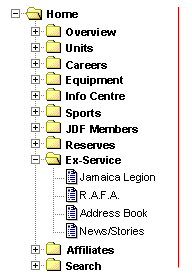  |
|
| Home > Ex-Service > Article – Caribbean Association of Military Professionals (C.A.M.P.) | |

|
Background to the Formation to the Organization ORIGIN OF IDEA The idea of a retired Military Association to manage the resettlement needs of all ex service personnel of the JDF including post world war veterans, was originally discussed between Col. "Bunny" Stern and then Major Stacey Thompson in London, England in 1988. It was not until some ten years later at the home of retired Lt. Col. Stacey Thompson that C.A.M.P. was born with a meeting convened by himself and attended by other Jamaican and Guyanese retired officers Major Hylton McDavid (Guyana), Mr. Wayne Longmore (Jamaica) and Capt. Raymond Eytle (Guyana). After a number of initial planning meetings over a one year period, that competed with the hectic personal schedules of these founding members, a steering committee was formed with the aim of launching the organization, and of establishing chapters in at least three (3) Caribbean countries. This committee comprised: Lt Col Stacey Thompson – Chairman Major Errol Alliman – V/Chairman Col "Bunny" Stern Major Ian Miles Capt Raymond Eytle Major Charles Rodriquez Mr. Derrick McKoy Major Winston Dwyer Ms Christine Morrell – Coordinator NEED FOR ASSOCIATION Founding members saw a great need for resettlement of retiring soldiers to include psychological, medical and financial counseling as well as job placement services. It was felt that this was outside the mandates of existing associations (Jamaica Legion, RAFA and Ex-services league) which were established and performed creditably for World War veterans, but did not seem to appeal to younger, post-independence retired soldiers, despite sustained recruitment efforts over many years by various regimes. A secondary need was also identified for assistance in rebuilding basic civic principles, positive values and leadership among our people, particularly the youth. It was felt that this organization should make its members available as required in leadership roles to this end. These needs were found to be common among other Regional Forces in their respective countries, as was ascertained by Col. Thompson during regular discussions with his retired military counterparts while on private assignments in these countries. The need was therefore identified for a REGIONAL organization with a much WIDER MANDATE than currently existed or was considered feasible to modify.
|
|
|
|